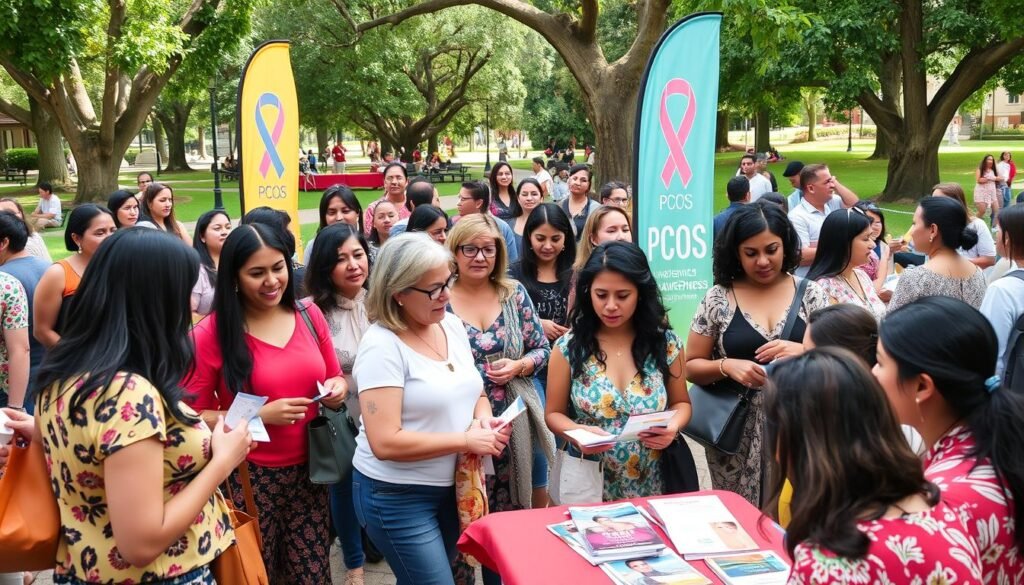Did you know over 50 percent of women with PCOS will face diabetes or pre-diabetes by 40? This fact shows how vital it is to have a PCOS support network. Dealing with PCOS brings both emotional and physical hurdles. A network of support is key to handle this condition. When people with similar struggles connect, they navigate their journey better and get crucial PCOS community support.
Creating a support group leads to talks about lifestyle changes and learning how to manage symptoms. It also gives a sense of belonging that boosts emotional health. Facing PCOS is easier with others. Sharing resources and advice makes the journey less daunting.
To learn more about getting support for your PCOS journey, visit this helpful article.
Key Takeaways
- PCOS affects approximately 1 in 10 women and individuals assigned female at birth.
- Forming a support network can provide emotional relief and shared resources.
- Higher risk of diabetes and heart disease emphasizes the importance of community support.
- Engaging with others can enhance commitment to lifestyle changes recommended for PCOS.
- September is PCOS Awareness Month, an excellent opportunity to advocate for support and education.
- Community interactions boost morale and help mitigate feelings of isolation.
- Practical strategies and tips can be exchanged among members of a support network.
The Importance of a PCOS Support Network
It’s vital to have a support network for people with PCOS. Knowing about the PCOS challenges helps others find help and feel less alone. PCOS leads to symptoms like irregular periods, weight gain, and skin problems. By talking about these issues, we create a supportive community.
Understanding PCOS and Its Challenges
PCOS affects 8-13% of women at childbearing age. It can cause hair growth, acne, and even infertility. Many feel overwhelmed by these effects. The difficulty in understanding comes from everyone having different backgrounds. Delays in diagnosis are common, due to doctors not knowing enough and women hesitating to get help.
Emotional and Physical Effects of PCOS
PCOS doesn’t just affect the body; it hits emotions hard too. Feelings of loneliness, worry, and sadness are common. Fears about not being able to have children add stress. This condition doesn’t just cause physical issues; it impacts mental health too. Finding people to talk to who understand can really help.
| Effects of PCOS | Physical | Emotional |
|---|---|---|
| Common Symptoms | Weight gain, hirsutism, acne, menstrual irregularity | Anxiety, depression, feelings of isolation |
| Long-Term Risks | Insulin resistance, type 2 diabetes, cardiovascular issues | Increased prevalence of eating disorders |
| Diagnosis Challenges | Delayed recognition by healthcare providers | Frustration with lack of information and support |
Creating Your Own PCOS Support Network: Tips and Advice
Building a PCOS network is about being clear on your goals and spotting helpful people around you. Setting goals for your support group leads to more meaningful talks. It’s important to find folks who get the journey and can offer real support.
Defining Your Goals for the Support Network
It’s crucial to have clear goals for your PCOS support group. You might want emotional support, advice on managing PCOS, or to spread awareness. Knowing what everyone hopes to get out of the group improves its impact. Each aim helps you tackle PCOS challenges better, whether emotional or health-wise.
Identifying Supportive Individuals in Your Life
Finding people who want to understand PCOS and talk about it is key. They might be friends, family, or coworkers. Their different views and support matter a lot. Such a network grows stronger as everyone shares openly, making it easier to discuss PCOS.
Joining Existing PCOS Support Groups
Becoming part of PCOS support groups can really help in managing this syndrome. These groups offer support both in person and online. They make you feel you’re not alone and guide you on your journey.
Finding Local and Online Support Groups
There are many local and online groups. They are in community centers, hospitals, and through PCOS organizations. It’s easy to find and join these groups.
- Explore community centers and hospitals for local gatherings.
- Utilize social media platforms like Facebook to find online support groups.
- Check organizations such as PCOS Challenge, which conducts both online and offline initiatives.
Groups like these teach and support members. They show how to manage symptoms. Also, connecting with others can bring great comfort.
Benefits of Community and Shared Experiences
Support groups let people share tips and feel less alone. They offer:
| Benefit | Description |
|---|---|
| Emotional Support | Connect with individuals who understand the emotional impact of PCOS. |
| Shared Knowledge | Gain insights from others about effective coping mechanisms and treatment options. |
| Resources Access | Learn about available resources and specialists who provide tailored healthcare for PCOS. |
| Encouragement | Receive motivation from peers who are navigating similar struggles. |
Being active in these groups can lessen anxiety and depression linked to PCOS. Places like the PCOS Challenge provide strong networks and helpful info, increasing your well-being.
Raising Awareness About PCOS
Spreading the word about PCOS is crucial for helping those affected by it. About 1 in 10 women of reproductive age have PCOS. It’s important to teach loved ones about it. Friends and family often misunderstand it because they don’t have enough information. Giving them resources like brochures or guiding them to good websites can make a big difference in their understanding and support.
Educating Friends and Family
Educating effectively can clear up wrong ideas and encourage empathy. Families need to know about PCOS symptoms, like irregular periods, acne, and weight gain. This knowledge helps create a supportive environment. It makes it easier for people to talk about their experiences. Open talks increase PCOS awareness in families, building a strong support network.
Using Social Media for Awareness
Social media is great for spreading the word about PCOS and connecting with others. By advocating on social media, people can share their stories and insights. This helps educate a wider audience. Using hashtags like #PCOSAwareness can start conversations and connect women who face similar issues. This group effort not only raises awareness but also inspires more people to join in.

Sharing PCOS Resources
Sharing resources is crucial for those dealing with PCOS. It helps people get the information and tools they need for better management of the condition. By collecting trusted advice, individuals can feel more in control.
Collecting Reliable PCOS Management Strategies
Understanding various successful PCOS strategies is key. This includes following special diets, exercising regularly, and exploring holistic therapies.
- Dietary guidelines tailored for PCOS
- Exercise routines designed to improve overall health
- Alternative therapies for holistic wellness
By using trusted sources, individuals can gather valuable PCOS resources. This creates a guide that can help everyone. The aim is to offer practical advice for people’s unique journeys.
Creating a Resource Database for Group Members
A shared database makes information easy to find within the network. This central resource allows members to quickly find important details such as:
| Resource Type | Description | Link/Contact Info |
|---|---|---|
| Articles | Research-backed insights on PCOS management | Access here |
| Webinars | Live sessions with experts discussing PCOS | Email for updates |
| Healthcare Specialists | Contact information for PCOS-focused doctors | Compile locally |
This database boosts members’ knowledge and encourages sharing of new PCOS findings. As the network grows, the available information expands. This ensures all members have what they need for effective self-management.
Incorporating PCOS Advocacy into Your Support Network
Creating a strong support network for PCOS means more than just help and care. It also means making PCOS advocacy a priority. By spreading the word about PCOS risks, people can stand up for their health. They can also help others understand this issue better.
Understanding Health Risks of PCOS
About 1 in 10 women and individuals assigned female at birth are affected by PCOS. This condition leads to risks like type 2 diabetes, heart problems, and trouble sleeping. Knowing about these risks is key for good advocacy. Being aware helps people seek early help and improve their life quality.
Engaging in Community Awareness Activities
Being part of community activities can really raise PCOS awareness. Hosting talks, walks, or online events for PCOS brings people together. These events not only spread the word but also build unity in facing PCOS challenges. Getting involved helps teach people and their supporters about PCOS and its health risks.

Coping with the Emotional Aspects of PCOS
Individuals with PCOS often face emotional challenges. These can greatly affect their life quality. Understanding and tackling these emotional issues is key. It’s important when seeking mental health help and managing feelings like anxiety and depression. Recognizing and dealing with these emotions is critical for emotional health.
Seeking Mental Health Support
Talking to a skilled mental health professional is very helpful for those with PCOS. They know a lot about PCOS and offer specific ways to handle its emotional challenges. This support helps individuals openly discuss their feelings. They can address ongoing problems like anxiety, depression, or mood disorders. These issues are often seen in people with PCOS.
Addressing Anxiety and Depression Linked to PCOS
It’s vital to acknowledge anxiety and depression in PCOS. Knowing what triggers these feelings and using coping tools like mindfulness helps a lot. Support from friends or groups also makes a big difference. It cuts down on loneliness and builds community. With a supportive network and using good resources, coping becomes easier. This leads to better emotional health.
| Emotional Challenge | Potential Impact | Coping Strategy |
|---|---|---|
| Anxiety | Interferes with daily life and functioning | Mindfulness and Cognitive Behavioral Therapy (CBT) |
| Depression | Persistent feelings of sadness and hopelessness | Therapeutic support and exercise |
| Social Isolation | Feelings of loneliness and disconnectedness | Support groups and community involvement |
By using these strategies and seeking mental health support, people can better handle PCOS’s emotional sides. This leads to better overall well-being.
Encouraging PCOS Lifestyle Changes
Making lifestyle changes is key for women with Polycystic Ovary Syndrome (PCOS). Eating well and exercising regularly can greatly improve their health. This tackles both the physical and emotional hurdles linked to PCOS.
Implementing Healthy Eating and Exercise
Eating right is vital for controlling PCOS. A diet full of whole grains, lean protein, and fruits and vegetables is recommended. Women should also cut down on sugar to help with weight control. This is because being overweight can make symptoms like irregular periods and insulin issues worse.
Working out regularly helps with losing weight and boosts metabolic health. Research shows that changing one’s diet and exercising more can lead to losing about 1.68 kg. It can also lower the body mass index (BMI) a bit for those with PCOS.
Exploring Holistic Approach and Self-Care
For women with PCOS, holistic self-care can make a big difference in their well-being. Activities like yoga and meditation reduce stress and anxiety. Connecting with others offers much-needed emotional support.
Trying out personal self-care tactics can be very helpful. This includes using supplements like probiotics and chromium. Probiotics can lower inflammation, and chromium might help keep a healthy body weight. Women who need more help can find resources on creating strong support networks by visiting this link.

Utilizing Professional Support
Dealing with Polycystic Ovary Syndrome (PCOS) is tough. That’s why professional help is super important. Regular meetings with doctors specialized in PCOS are key. They help create treatment plans just for you, tackling health concerns effectively.
Finding Medical Experts Specialized in PCOS
It’s crucial to find doctors who really know about PCOS. These specialists get the challenges that come with it. They help with hormone issues and weight problems caused by insulin resistance. Plus, they give advice on lifestyle changes. Seeing doctors focused on PCOS means getting care that really fits your needs.
Collaborating with Therapists for Emotional Well-being
PCOS doesn’t just affect your body; it hits hard emotionally too. Working with therapists who know about PCOS can make a big difference. They offer ways to deal with anxiety, depression, and issues with how you see yourself. Teaming up with medical and mental health experts creates a caring space. This helps people deal with both the physical and emotional parts of PCOS.
| Type of Support | Description |
|---|---|
| Emotional Support | Provides a comforting presence, crucial for mental health. |
| Esteem Support | Boosts confidence and self-worth through validation. |
| Informational Support | Offers insights and knowledge beneficial for decision-making. |
| Instrumental Support | Assists with tangible help, such as transportation or medical care. |
Planning Network Activities and Meetups
Creating a support network for women with PCOS is very helpful. It involves fun meetups and activities. People can share stories and make stronger connections at these events. Meetups might include workshops, seminars, or just hanging out together.
Organizing Events to Strengthen Connections
Shared experiences are key to building a community. Activities that match the group’s interests help form close bonds. This leads to better emotional and social support.
Educational sessions can help everyone learn more about PCOS. This might help reduce anxiety and make life better. These events make people feel like they belong and are powerful together.
Online vs. In-Person Gatherings
Group meetings can be online or in person, each with its own benefits. Online meetups are easy to join from anywhere, helping more people take part. These can reach a bigger audience with similar experiences.
In-person meetings, however, allow for closer connections and trust-building. Mixing both types of meetings can serve everyone’s needs. This makes the community welcoming for all.
For tips on handling stress and feeling better, you might want to check out this helpful link.
Building Advocacy for PCOS Empowerment
Personal stories are vital in promoting PCOS empowerment. They highlight the real challenges women with polycystic ovary syndrome face. Women’s testimonials about their healthcare journeys show the need for better medical care. Many were given basic advice instead of detailed help.
This shared experience brings people together. It encourages others to share their stories. This builds a stronger understanding of PCOS.
Personal Stories and Testimonials
Women often see several doctors before getting diagnosed. They feel ignored and get little post-diagnosis support. Sharing stories helps raise awareness.
It shows the importance of better healthcare support. Stories empower women to seek change. Efforts by advocates like Ashley Levinson have widened the conversation. They show how personal stories can lead to group action.
Creating a Movement for Greater Awareness
A unified effort is essential for building advocacy. Social media campaigns and events increase PCOS awareness. They help educate the public and support the community.
Being part of these efforts highlights key issues. It addresses the stigma of PCOS and calls for specialized care. Better awareness leads to early symptom recognition. For more details, visit this resource.
Conclusion
Having a PCOS support network is key for those dealing with polycystic ovary syndrome. With up to 13% of women affected, the value of such a community is clear. These groups offer a place to share stories, find resources, and push for better care and understanding.
By supporting each other, people with PCOS grow stronger together. This support helps tackle PCOS’s emotional and physical issues. It also promotes self-care and healthy living. Women in these groups learn to manage symptoms and feel less alone.
The PCOS journey might seem hard, but no one has to go through it by themselves. Using support network resources, individuals can become more resilient. They can stand up for their health needs and live well with PCOS. As a community, positive changes happen, improving many lives affected by this syndrome.